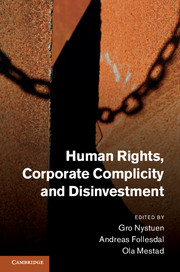Book contents
- Frontmatter
- Contents
- Note on the contributors
- Referenced case law
- Acknowledgements
- 1 Introduction
- 2 Disinvestment on the basis of corporate contribution to human rights violations: the case of the Norwegian Government Pension Fund
- 3 Laws, standards or voluntary guidelines?
- 4 Responsibility beyond the law?
- 5 Attribution of responsibility to listed companies
- 6 Responsibility for human rights violations, acts or omissions, within the ‘sphere of influence’ of companies
- 7 Human rights investment filters: a defence
- 8 The moral responsibilities of shareholders: a conceptual map
- 9 Sovereign wealth funds and (un)ethical investment: using ‘due diligence’ to avoid contributing to human rights violations committed by companies in the investment portfolio
- 10 Corporations and criminal complicity
- Appendices
- Bibliography
- Index
3 - Laws, standards or voluntary guidelines?
Published online by Cambridge University Press: 07 October 2011
- Frontmatter
- Contents
- Note on the contributors
- Referenced case law
- Acknowledgements
- 1 Introduction
- 2 Disinvestment on the basis of corporate contribution to human rights violations: the case of the Norwegian Government Pension Fund
- 3 Laws, standards or voluntary guidelines?
- 4 Responsibility beyond the law?
- 5 Attribution of responsibility to listed companies
- 6 Responsibility for human rights violations, acts or omissions, within the ‘sphere of influence’ of companies
- 7 Human rights investment filters: a defence
- 8 The moral responsibilities of shareholders: a conceptual map
- 9 Sovereign wealth funds and (un)ethical investment: using ‘due diligence’ to avoid contributing to human rights violations committed by companies in the investment portfolio
- 10 Corporations and criminal complicity
- Appendices
- Bibliography
- Index
Summary
Introduction
The question of how to influence the human rights behaviour of multinational corporations has long been a concern of non-governmental organizations, scholars and governments. Their efforts at mobilization, analysis and regulation have achieved mixed results. More recently, pension funds and other institutional investors have assumed an important role in channelling such influence into a form that may exert greater leverage on the decision-making process of a multinational: through its shareholders. Companies with operations in Myanmar (Burma) and Sudan have been punished for their ties to governments engaged in human rights abuses; a far larger number have signed onto voluntary principles and codes of conduct embracing best practice in the field of human rights. These various efforts to shape behaviour through inducements and public pressure are an admission that traditional regulation through coercion for violations of specific rights is not working. Praise for ‘corporate social responsibility’ generally assumes that traditional regulation cannot work; criticism often asserts that the illusion of accountability undermines the prospects of establishing an effective mechanism with teeth and is worse than nothing at all.
Leaving aside that larger question of whether formal regulation – such as through treaty or legislation – is desirable or possible, should the ad hoc efforts of investors to shape the human rights behaviour of the companies in which they own shares themselves be regulated? That is, by what standard, if any, should the activist shareholder be judged? This chapter will consider this question in the context of the Council on Ethics of the Norwegian Government Pension Fund – Global.
- Type
- Chapter
- Information
- Human Rights, Corporate Complicity and Disinvestment , pp. 44 - 63Publisher: Cambridge University PressPrint publication year: 2011
- 4
- Cited by



